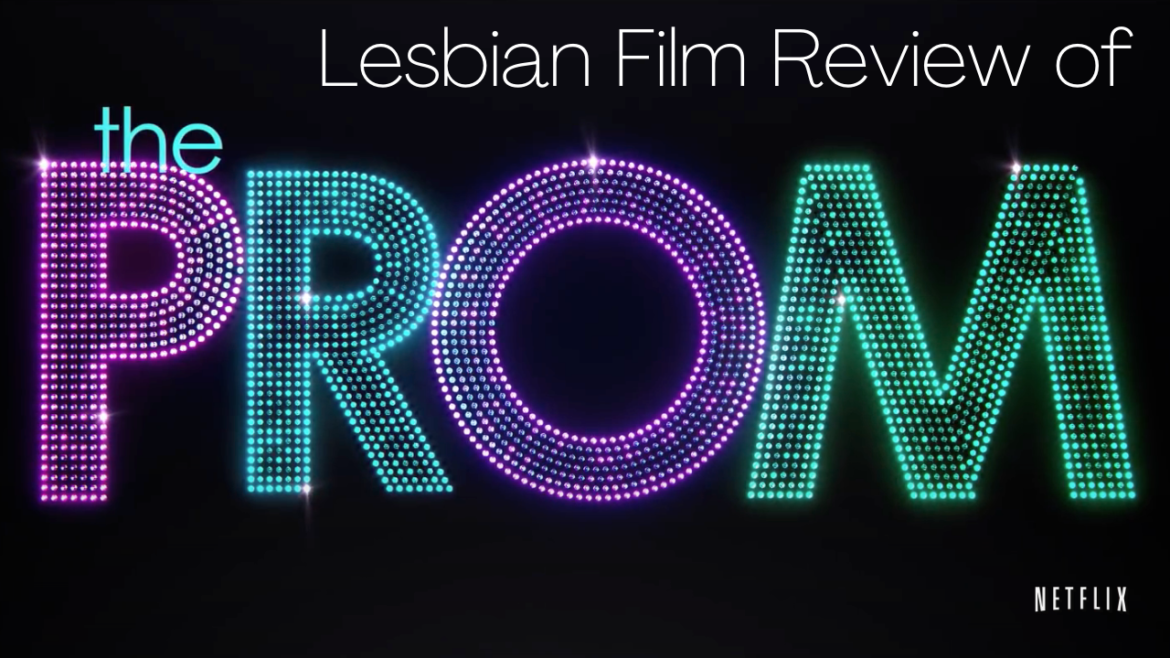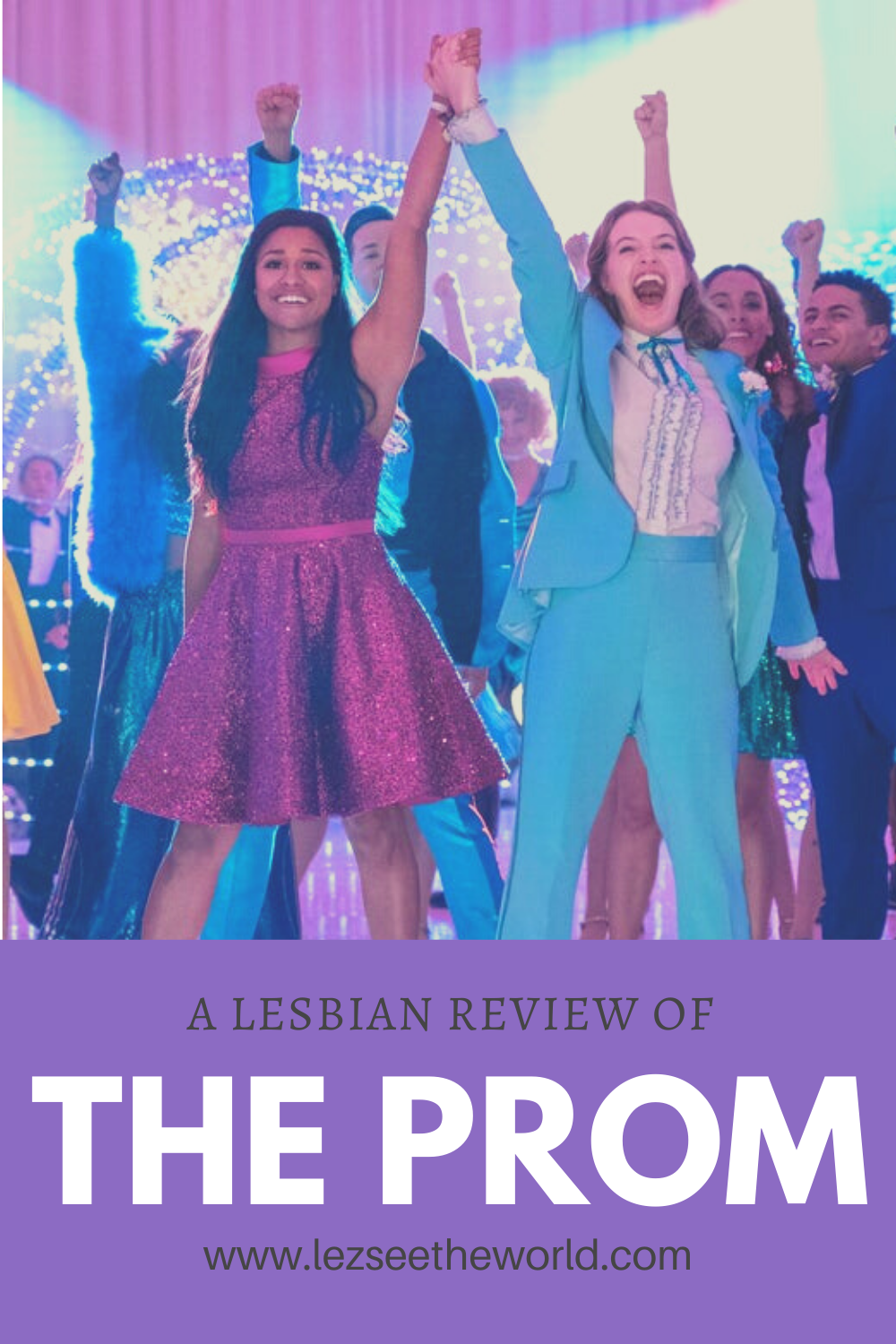As dedicated musical theatre nerds, we were extremely excited for this release. A movie musical with a lesbian storyline? Cue the excitement! The Prom, a Ryan Murphy film that was just released as a Netlix original, is actually an adaptation of an original Broadway production of the same name. And while adaptations can definitely be hit or miss, we had high hopes for this one.
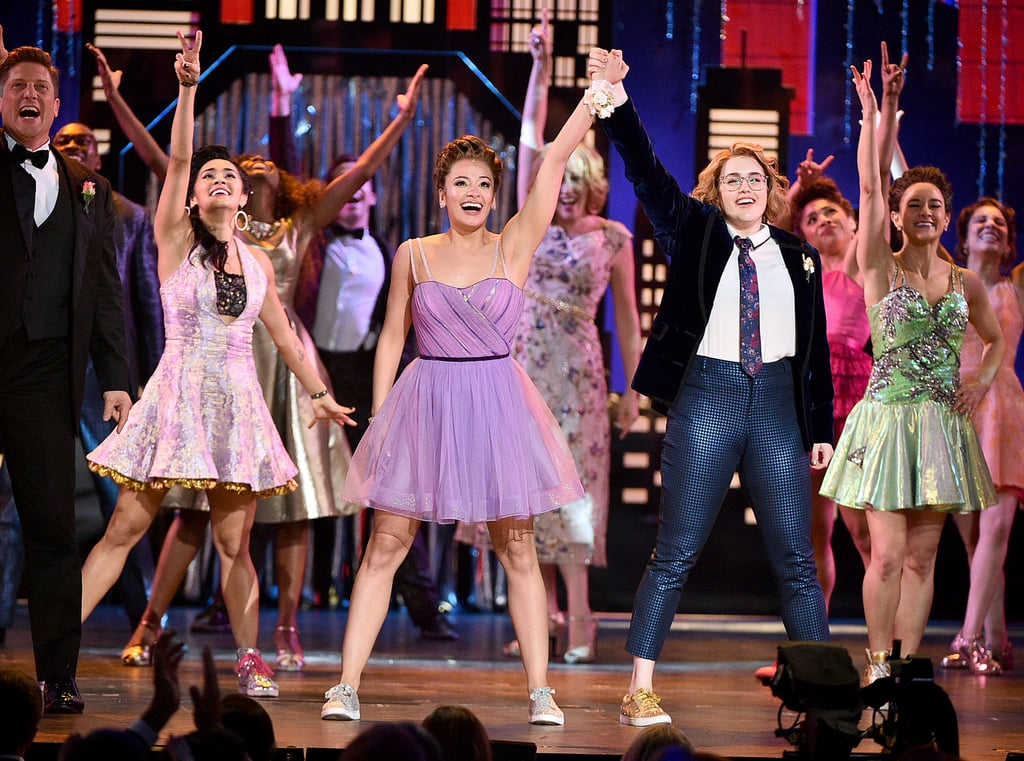
Original Broadway Cast – Getty / Theo Wargo
The Broadway show and its original cast collected a cult following in the theatre world, and is very beloved by queer fans. We were lucky enough to see the show on our last trip to NYC, and to say we loved it would be an understatement. I cried through nearly the entire thing, and Steph still can’t stop playing the cast album! It really was a very special show and we’re so fortunate that we were able to experience it. The Broadway production closed in the summer of 2019, and there was a lot of anticipation for the Netflix movie. It’s such a fun and heartwarming story, but can film adaptations ever be as good as the original work? We’re going to get into all of it here. Keep reading for a very lesbian review of The Prom.
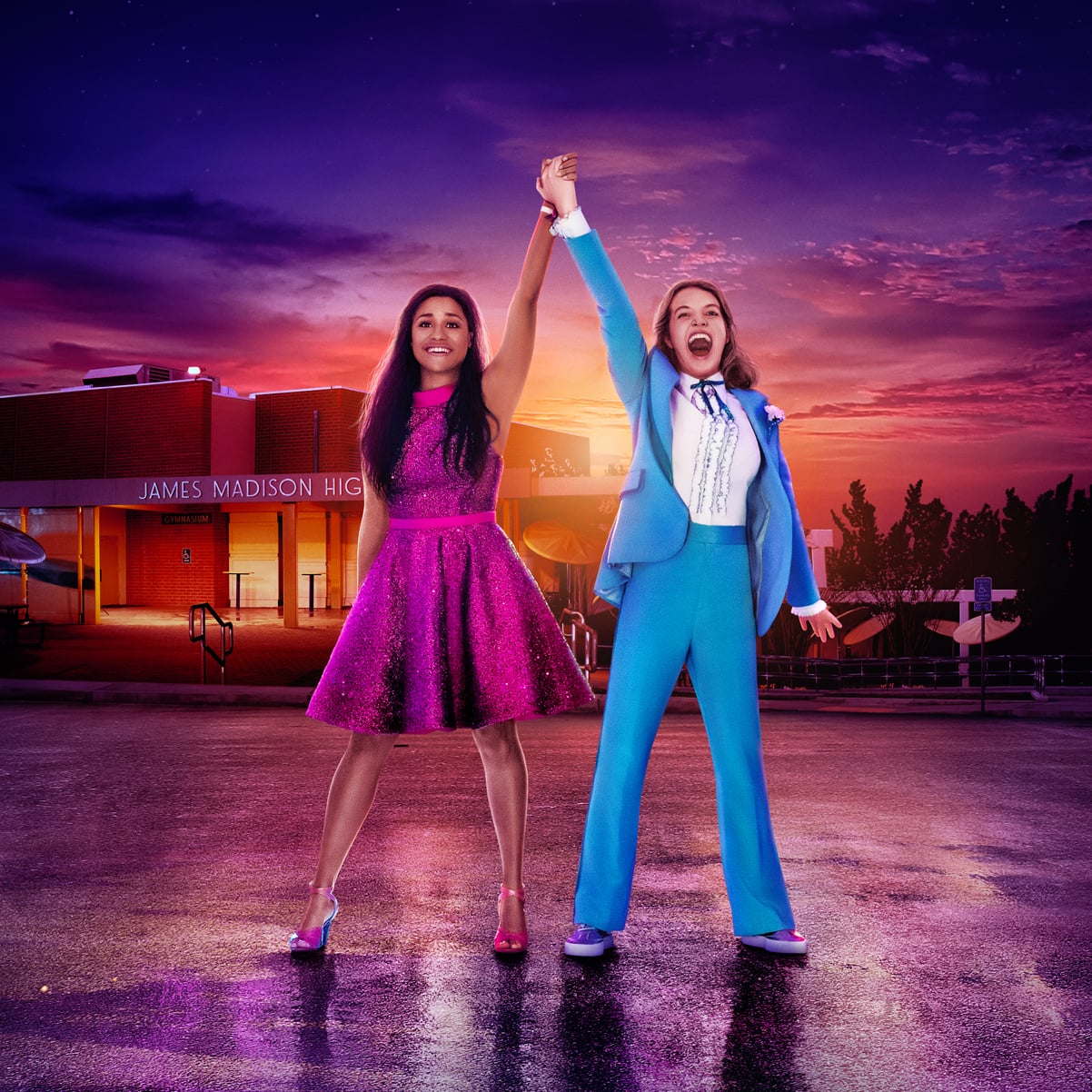
Netflix
Warning! The rest of this review includes spoilers for the film!
The Prom follows the story of four washed-up NYC actors, who head to small-town Indiana to show support for a local teen who isn’t allowed to take her girlfriend to prom. Dee Dee (Meryl Streep) and Barry (James Corden) are two self-absorbed stars who just received a terrible review that closed their Broadway show. After being accused of being narcissistic and irrelevant, they’re looking for a cause to rally behind to save their reputations. Joined by Broadway chorus dancer Angie (Nicole Kidman) and struggling actor/Julliard grad Trent (Andrew Rannells), they make their way to Indiana with mostly selfish intentions. In Indiana we meet lesbian teen Emma (Jo Ellen Pellman), as she battles the PTA and their move to cancel the high school prom rather than allowing it to be LGBTQ+ inclusive. Emma’s girlfriend Alyssa (Ariana DeBose), is the daughter of the PTA mom leading the charge, and nobody knows they’re dating.
Because of our love for the Broadway show we knew exactly what we wanted to see from this movie, even knowing it was going to be very Hollywood-ized. When the star-studded cast was announced we completely got behind the choices to include heavy hitters like Meryl Streep and Nicole Kidman, along with musical-theatre fave Andrew Rannells. However we immediately had reservations about the casting of James Corden as Barry. The role, originated by (and ultimately written for) Broadway powerhouse Brooks Ashmanskas, is very much a caricature of a flamboyantly gay man. Brooks (who is gay himself) played the role on stage with true comedic genius, as well as the much needed delicate nuance that a character like that requires. His performance even earned him a Tony nom! We definitely felt like a performance by a non-queer actor could easily become highly insensitive and a stereotypical gay trope. Was casting James Corden a big mistake? Well, as a straight cis man who ultimately knows nothing of the queer experience, you can probably guess how we (and most gay people) felt about it. We were, however, very happy at the news of queer Broadway favourite Ariana DeBose being slated to take on the role of Alyssa, along with newcomer Jo Ellen Pellman (another queer performer), in the role of Emma. The lesbian love story between the two teens is more or less the central plot, and it was amazing to see these characters both represented by queer performers. In the stage production the roles of Emma and Alyssa were also both played by queer actors, which is so incredible to see! It means a lot to the LGBTQ+ community to see queer stories being told on stage and on screen by queer people.
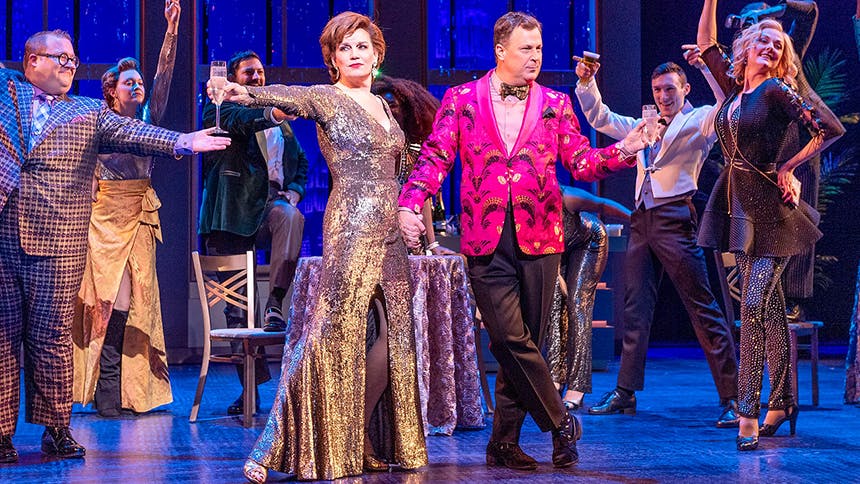
Beth Leavel and Brooks Ashmanskas – Photo by Deen van Meer
In the film version of The Prom, there really weren’t too many deviations from the stage show at first glance. All of the original songs were kept, though several were shortened. The main way in which the film differs from the original work is the plot, in that it included a lot of additional scenes and storylines, all of which felt entirely unnecessary. The movie spends a lot more time on Dee Dee, Barry, Angie, and Trent, in what seems like an effort to humanize their characters. It throws off the balance of the story in that they have far more screen time than the teens, and it feels like we don’t see enough of Emma and Alyssa when they are supposed to be the dominant plot. The original stage show establishes a very distinct difference between the over-the-top comedy driven shenanigans of the Broadway celebs, and the unembellished, emotional, delicate love story of the two girls. Emma’s life in Indiana feels very real, and the contrast of the four campy adults was obviously very intentional. That juxtaposition was achieved both through the plot and the character arcs, but also through the costuming and music. For example, Emma sings heartfelt ballads against a mundane backdrop of conservative small-town America, while the Broadway stars perform extravagant, show-stopping numbers that are meant to be funny and ridiculous. In the film, the addition of several emotional scenes for the Broadway stars disrupts this balance, and we couldn’t help but feel that we just wanted to see more of Emma and Alyssa!
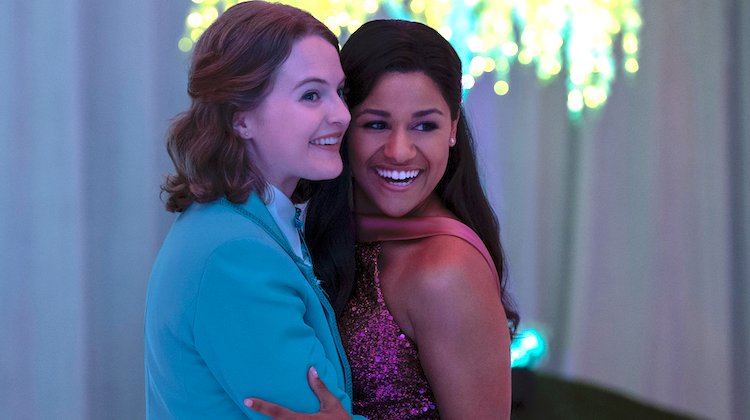
Netflix
Another main issue we had with Ryan Murphy’s vision for The Prom, is that the whole thing is a little hard to buy. (And yes we know this is a campy movie musical, but these details are important!). Even though Edgewater, Indiana is meant to be a “hick town” with only a K-Mart and an Applebees, that is not what Murphy creates for the film. The sets include big beautiful boulevards, a huge mall, and a gorgeous high school that has its own pool. The teenagers are all cool and fashionable, and even Emma is in no need of a makeover (her wardrobe is a hipster’s dream!). It’s hardly the “spam eating” small town the script keeps referring to, and the very Glee-like depiction really takes away from the theme of the story. We’re supposed to see a huge difference in the politics and beliefs of the Indiana residents and the progressive NYers, but he doesn’t make Edgewater feel very small town-y. It’s a bit hard to believe that there would be such rampant homophobia running through this place, as the film is set in 2020, (unlike the real-life happenings that the story is based on which happened back in 2010). Maybe if Ryan Murphy’s depiction of Edgewater resembled something like the town of Bomont from Footloose, it may have been more believable that the townsfolk needed some preaching to!
The Prom takes you through a story of love, acceptance, redemption, and growth, although it certainly does miss the mark more than once. A lot of the over-simplified messages about tolerance that worked hilariously on stage, don’t work quite as well on screen. The Broadway actors take Emma under their wing and work to change the minds of her fellow classmates and the PTA, but the film also spends a lot of time on secondary plots. For instance, Dee Dee and Barry’s friendship, the romance between Dee Dee and the school principal, and a reconciliation with Barry and his mom who kicked him out of the house when he was a teen for being gay. It’s a bit scattered and loses a lot of the magic that was present in the original. Everything we enjoyed about the film seems to be because we are such big fans of the Broadway show, and all the parts we loved were the parts that were kept the same. It didn’t feel like the adaptation really added anything, and all of the changes that were made meant that a lot of the key messages were lost.
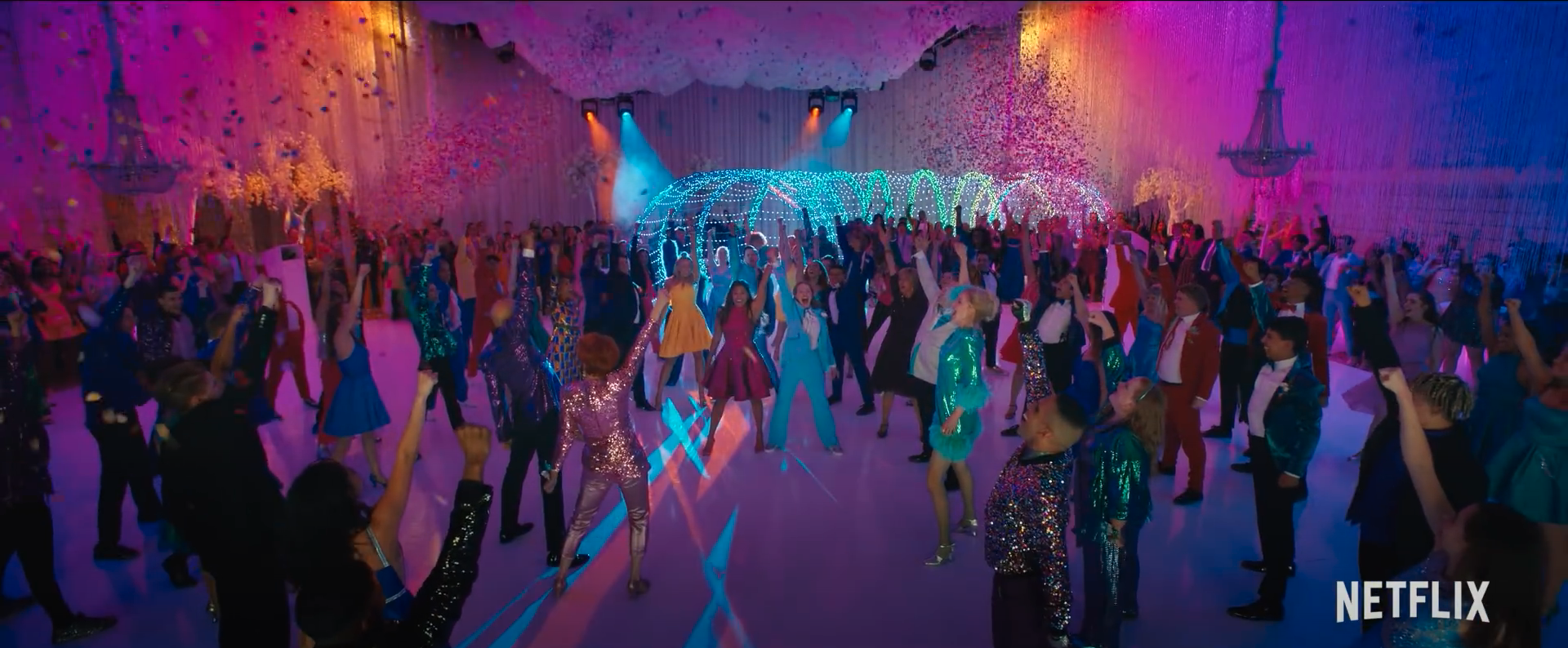
That being said, the performances by Jo Ellen Pellmen and Ariana DeBose were incredible, even if they were both under-utilized. We would have loved for their storylines to have been beefed up for the film, because I’m sure everyone would have loved more scenes of them! Alyssa’s coming out story felt glossed over, including her mother’s journey to accept her. Mrs. Greene (Kerry Washington) spends the entire film trying to shut down an inclusive prom, but then joins into a celebratory dance number after her daughter comes out to her. To be honest, while it’s amazing that this film offers so much LGBTQ+ representation, it really doesn’t handle the queer storylines very well at all. Their impact feels watered down, and that, coupled with the casting of James Corden just doesn’t sit well. His depiction of Barry definitely did come across as insensitive and offensive, and it begs the question of WHY cast him in the first place. Why not Sean Hayes, Nathan Lane, Billy Porter or one of the many other incredible, out, gay superstars? The casting choice honestly seems bizarre when it was obviously very intentional to cast queer women in the other gay lead roles. It also seems that Ryan Murphy was completely aware of the potential for disaster in how Corden was directed, and the changes that were made for the film. His Barry (while still over-the-top) is far more subdued, suggesting they were careful not to make the performance problematic. They also removed the word “dyke” from one of his lines, likely knowing it would be offensive. Rather than tip toeing and making every effort to not have the casting be controversial, maybe just cast someone else?
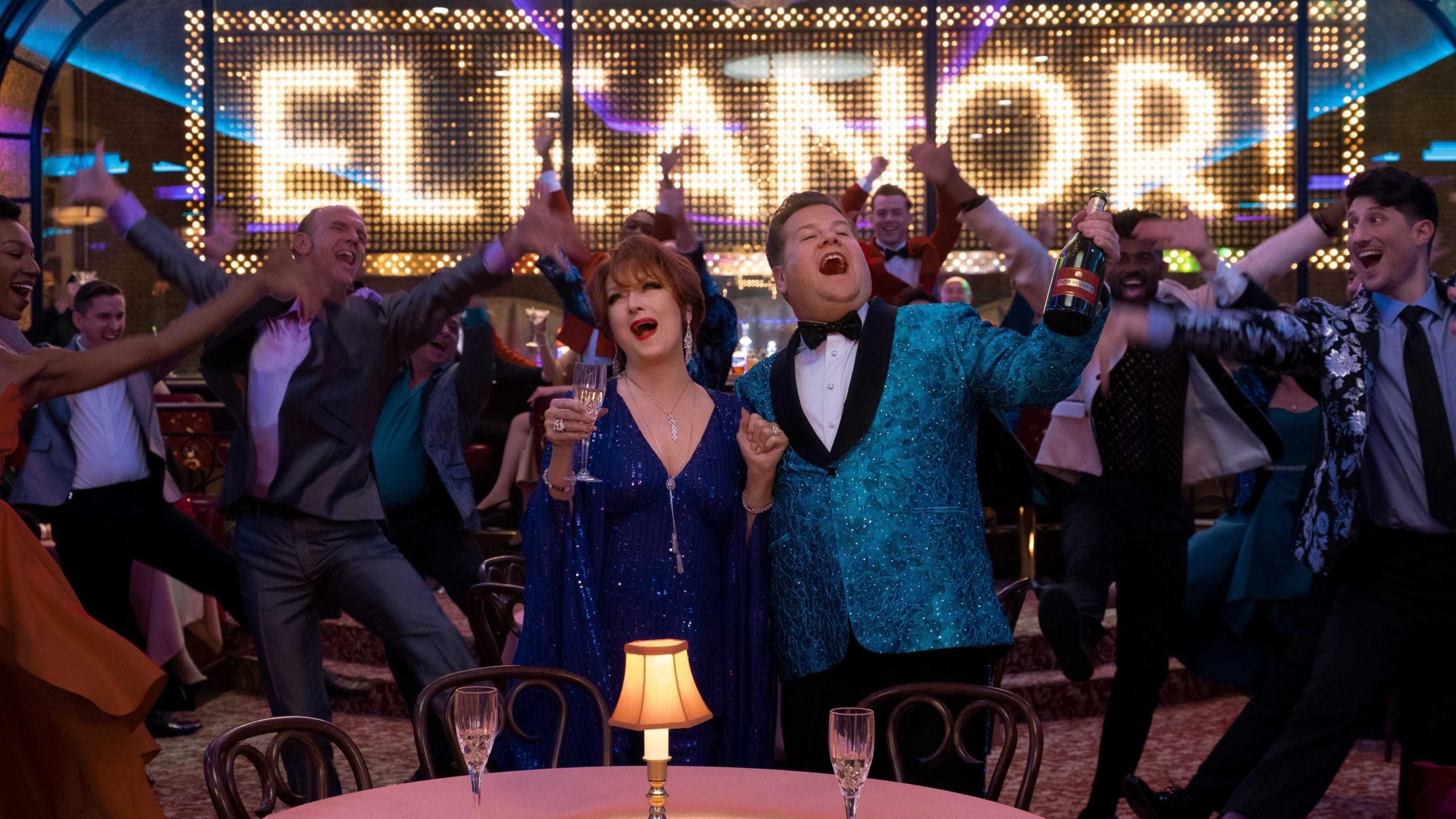
Netflix
Ultimately, although it’s great that The Prom has been opened up to a broader audience and more people get to experience some version of the story, we have so many mixed feelings. It feels a bit like Hollywood stomped all over something that was really special. The movie is flashy, but with little cleverness and no real heart. While the original work seemed to have a deep understanding of queerness, the film only skims the surface in a way that is palatable to a mainstream audience. In an effort to give everyone a happy ending, it takes out a lot of the conflict that felt necessary to the message. We never really got to see Emma’s real pain as the only out kid at her conservative school, being bullied by her classmates and having to sneak around with her closeted girlfriend. We missed out on a lot of the gay quirk and ridiculousness that the Broadway show was full of, ideas that worked beautifully on stage and made it the heartwarming masterpiece that it was. The addition of Mrs. Greene to the finale number completely undoes everything we learned about her character throughout the plot. Wrapping up her storyline with Alyssa in a neat little bow completely undercuts the real turmoil and fear that a gay teen would feel about coming out to their conservative family. The oversimplification of The Prom’s queer storylines is a real disservice to the LGBTQ+ community. Giving Barry a reconciliation with his mother felt very after-school-special, and lacked the nuance of real-life complicated family dynamics. Giving all the queer leads simple happy endings that included positive relationships with biological family members felt superficial. It doesn’t speak to the real queer community that so often has to create their own families with other queer people who suffer the same trauma of not being accepted by their families of origin. The happy endings felt similar to the way LGBTQ+ people were represented on Glee, and felt outdated rather than going deeper to represent the real world today.
The film really tried to hammer home the message that parents should accept their queer children, but it offers no subtlety. We didn’t need to see Alyssa’s mom standing by in support while she kisses her girlfriend in front of everyone for the first time. The audience just needed to know that at some point, things were going to get better for Alyssa, and for Emma. We also didn’t need to see Barry reconnect with his mom while she begs for forgiveness all these years later. She only comes to find him because Dee Dee calls her, and springing a reunion like that on someone really isn’t okay. The queer message of the movie doesn’t have to be – it gets better because your family will eventually come around. How about – it gets better because you get to live life as your authentic self, you will find people who will love you unconditionally, and you will be a part of a community that will be your family.
So, is the film worth seeing? If you enjoy movie musicals and can take most of the story with a grain of salt, it can certainly be a fun watch. But we highly recommend seeking out some of the source material if you can, even if it’s just a couple of songs by the original cast. They deserve immense credit for bringing this story to life, and making it so incredibly special.
Have any of you watched The Prom? What did you think? Let us know in the comments!

